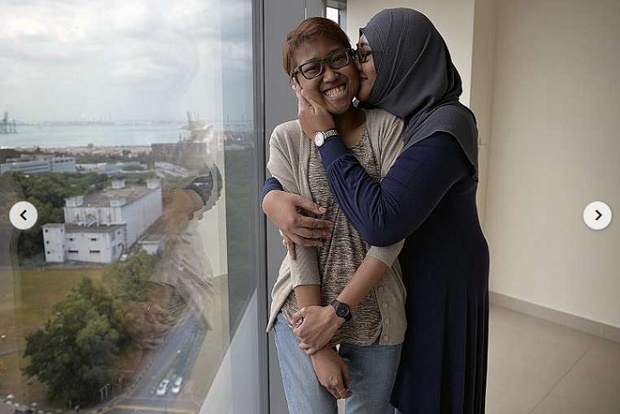First paired kidney exchange transplant in Singapore

Ms Siti Rasyidah Lokman Hadan (left), 23, is Singapore’s first recipient of a paired kidney exchange transplant. Someone who came forward to donate a kidney to a stranger was found to be a match for Ms Siti. In exchange, her mother, Madam Noor Rafidah Nasir, 47, gave one of her own kidneys to a person on the national waiting list. The Straits Times/ANN
When doctors said her daughter needed a new kidney, Madam Noor Rafidah Nasir immediately volunteered one of her own.
But then came the bad news—Madam Rafidah and her daughter, Siti Rasyidah Lokman Hadan, were not a match.
“I was heartbroken,” recalled the 47-year-old housewife. “I cried.”
Then doctors approached her in August 2014 with a novel proposal known as a paired kidney exchange transplant.
Someone had come forward wanting to donate a kidney to a stranger, and was found to be a match for Siti. In exchange, her mother would have to give one of her kidneys to a person on the national waiting list.
Article continues after this advertisementSiti, 23, became Singapore’s first recipient of such a transplant in April last year, at the National University Hospital (NUH).
Article continues after this advertisementThe procedure has been approved since 2009, but has never been carried out until last year because of a lack of pairs who were both willing and medically fit.
“Between 2009 and 2014, nobody entered the pair exchange registry… and there was a lack of enthusiasm from patients,” said Professor A. Vathsala, co-director of the National University Centre for Organ Transplantation at NUH.
For example, some feared that they would donate a kidney only to find that the one received by their loved one did not work.
Currently, there are 450 patients on the waiting list for a new kidney. The average waiting time is around eight or nine years.
Each year, two to three people offer to donate their healthy kidneys to strangers—as in Siti’s case—but in general, only one is found suitable in the end.
Siti has systemic lupus erythematosus—a condition in which the immune system mistakenly attacks the body—and was born with abnormal kidneys.
By 15, she was having regular dialysis. At 22, her condition had deteriorated so much that her doctors were on the brink of carrying out the mismatched transplant despite its many risks.
“We would have gone ahead; we had already prepared all the forms,” said Professor Yap Hui Kim, head of the paediatric nephrology division at NUH.
The recipient of such an incompatible transplant would typically have to take medication to prevent her immune system from attacking the foreign organ.
However, Siti’s medical condition meant that doing so would further weaken her and leave her susceptible to various infections.
Siti used a wheelchair for four years but can now walk. “Being able to walk was a big thing for me,” said the oldest of four children. She plans to take her A-level examination this year and hopes to become a teacher.
She does not know who donated the kidney to her. Nor does her mother know who her kidney went to. The identities of donors and recipients in a paired kidney exchange transplant are kept secret to avoid feelings of mutual obligation, or pressuring anyone to donate out of pity, Prof Vathsala said.
But mother and daughter are glad for the chance to pay it forward. Said Siti: “It’s only natural that after I get something, we give something in return.”
RELATED STORIES
On kidney failure and transplantation
A rejoinder on cost-effectiveness of kidney and liver transplantation